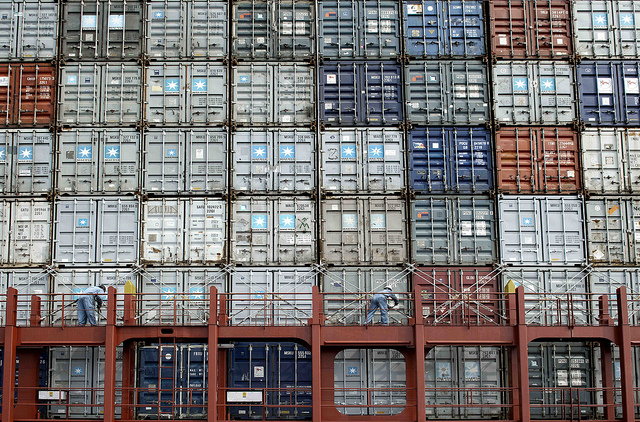
EU officials race against the clock to save CETA trade deal
by Raf Casert, The Associated Press

The leader of Belgium's holdout region Wallonia has struck a more conciliatory tone on the issue of CETA's "private arbitration" in which multinationals can legally challenge governments on policies

The trade agreement, which will greatly reduce tariffs on trade between Canada and some 500 million Europeans, hangs on the tiny region on Wallonia. PHOTO: Maersk Line, via Flickr
BRUSSELS—In a race against the clock, the European Union was edging closer to being able to sign the CETA free trade deal with Canada on Thursday after Belgium made progress in lifting the veto of one of its region.
EU President Donald Tusk told EU legislators Wednesday that “the summit tomorrow is still possible” after days of talks in Brussels between the national government and its regions seemed to be heading for a breakthrough.
Belgium needs all its regions to sign on and the EU, in turn, needs unanimity among all its 28 states.
Canadian Prime Minister Justin Trudeau was still ready to come over to Brussels for Thursday’s summit and official signature of the deal.
Belgian Foreign Minister Didier Reynders said during a break in talks on Wednesday that “all necessary documents” could be sent to EU officials later Wednesday for a final vetting among member states.
Paul Magnette, the leader of Belgium’s holdout region Wallonia, said that some details still need to be clarified, notably in the agriculture sector and a special dispute settlement court.
Yet, the language he used was more conciliatory than the fundamental objections he had wielded until early this week.
If there is no quick agreement from Wallonia, Thursday’s EU-Canada summit could be scrapped.
Politicians in Wallonia, which has a population of 3.6 million compared to over 500 million for the whole EU, argue the CETA accord would undermine labour, environment and consumer standards.
Proponents say it would yield billions in added trade through customs and tariff cuts and other measures to lower barriers to commerce. At the same time, the EU says it will keep in place the region’s strong safeguards on social, environmental and labour issues.
Magnette said a key hurdle was the issue of “private arbitration” in which multinationals can legally challenge governments on policies.
He said Wallonia’s insistence on a better deal would bolster EU standards and set a strong precedent for other trade talks between Europe and trading partners like the United States or Japan.